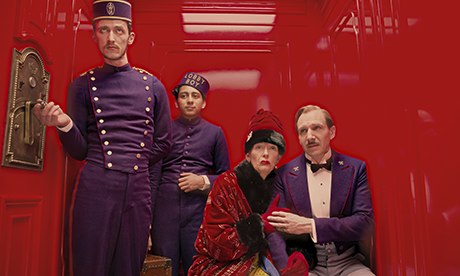By Mark Saldana
Rating: 3.5 (Out of 4 Stars)
I have yet to grow tired of Wes Anderson’s style of storytelling. With each new film he makes, I look forward to the colorful sets, the equally colorful characters and the overall exquisite way he presents his stories. His brand of humor almost always keeps me smiling and laughing. With his latest offering, Anderson delivers all of the expected color, humor and characters that his fans come to expect. The Grand Budapest Hotel is a highly enjoyable cinematic journey and visual feast for Wes Anderson fans.
Anderson and co-writer Hugo Guinness tell the story of Zero Moustafa (Tony Revolori/F.Murray Abraham) and how he came to be the owner of the world famous titular hotel, having started out as a simple lobby boy. In 1932 Zero began working at the hotel under the guidance of concierge M. Gustave (Ralph Fiennes) and would become Gustave’s best friend and most trusted confidant. Zero and Gustave go on an incredible adventure after Gustave gets accused of a murder he didn’t commit.
Inspired by the writings of Stefan Zweig, Anderson and Guinness tell a wildly funny tale with Anderson’s signature style. Much like his previous films, The Royal Tenenbaums, The Life Aquatic with Steve Zissou, and Moonrise Kingdom, Grand Budapest is another Anderson storybook come to life. Even though the presentation doesn’t look like anything that exists in real life, the characters in the film must cope with real life problems and issues. This time, though, his attention to visual detail often overshadows the script and story which does provide much humor. However, with its multitude of characters and caricatures, the film’s purpose gets a tad bit muddled with all of its stylings.
Anderson’s world here is rich and lavish, but perhaps a little overindulgent. Don’t get me wrong. I really enjoyed this film, but I feel that the story itself takes a backseat to the presentation and to the jokes and visual gags; though it’s not due to a lack of trying. Plots and subplots abound as do loads of characters and cameos. This might be Anderson’s most ambitious film, but he doesn’t accomplish as much as he has in the past (Bottle Rocket, Rushmore, The Royal Tenenbaums).
The film has an impressive cast of acting talents. For once, the usual Wes Anderson regulars (Owen Wilson, Jason Schwartzman, Bill Murray) appear in brief cameo roles. This allows Anderson first timers (Ralph Fiennes, Tony Revolori, F. Murray Abraham, Jude Law, and Saoirse Ronan) to shine, and they shine brightly here. The film also features Anderson alumni Adrien Brody, Willem Dafoe, Jeff Goldbum, Edward Norton, and Tilda Swinton in fun and certainly memorable roles.
Though this movie may represent Wes Anderson at his most indulgent and unrestrained, he still manages to make it all work as a whole. Even though The Grand Budapest Hotel may not be his one of his best films, it is still a bright addition to a celebrated and acclaimed career of unique and exciting filmmaking. For those who don’t particularly care for his brand of storytelling, I’d recommend skipping this film, but I must encourage his most ardent fans to see it, as they should be mostly pleased.
